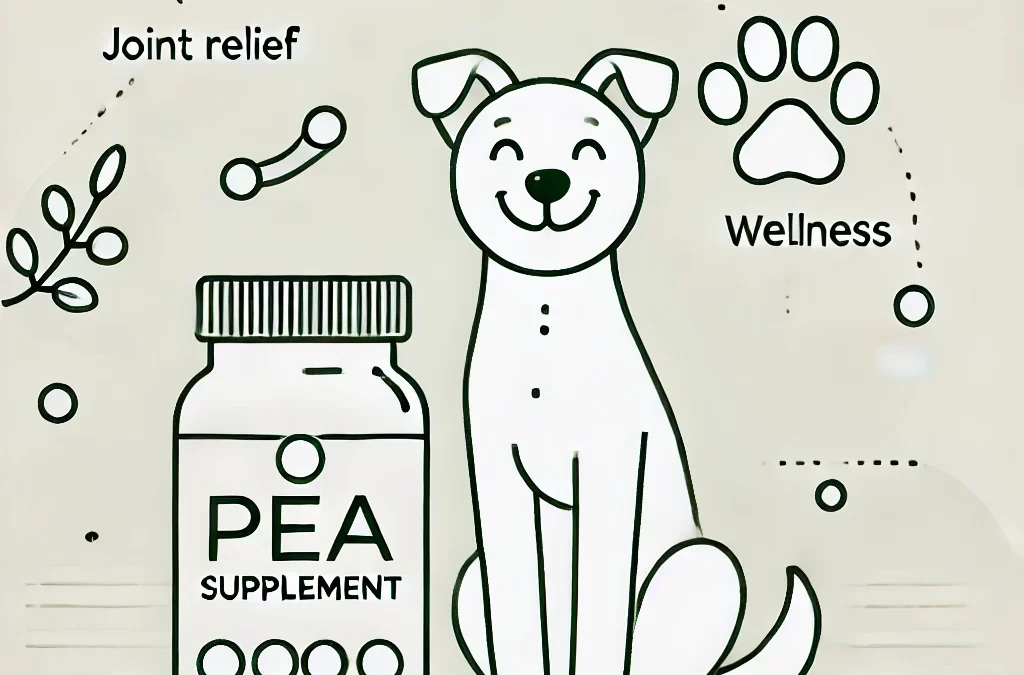Palmitoylethanolamide, or PEA, is gaining popularity in the world of canine care for its natural pain-relieving and anti-inflammatory properties. Originally discovered as a body-produced fatty acid amide, PEA is an endocannabinoid-like compound found in various tissues, including the brain and immune system. This unique compound, present in foods like eggs and soy, has shown potential benefits in supporting pain management and reducing inflammation in both humans and animals. But what does it mean for our canine companions?
What is PEA, and Why is It Useful for Dogs?
PEA is naturally produced in the bodies of humans and dogs alike as a response to inflammation and pain. As an endogenous compound, PEA works with the endocannabinoid system to help modulate inflammation and pain perception without psychoactive effects. This makes it a safer alternative for pets compared to traditional pharmaceuticals, especially for long-term use.
Key Benefits of PEA for Dogs:
- Pain Relief: PEA interacts with receptors in the nervous system, providing a natural means of reducing discomfort.
- Anti-Inflammatory Properties: It works on the body’s immune response to decrease inflammation, which can benefit dogs suffering from arthritis, dermatitis, and other inflammatory conditions.
- Improved Quality of Life: By alleviating pain and inflammation, PEA may improve mobility, energy levels, and overall well-being.
How Does PEA Work?
Unlike other pain medications, PEA doesn’t block the pain signals directly. Instead, it works on what’s known as the “entourage effect,” enhancing the natural processes that regulate pain and inflammation. Here’s a simplified look at how it works:
- Interaction with Cannabinoid Receptors: PEA indirectly interacts with cannabinoid receptors (CB2 receptors) in the immune system, promoting a balanced immune response.
- Inhibition of Inflammatory Enzymes: It inhibits enzymes that fuel inflammation, allowing the body’s natural healing processes to work more effectively.
- Mast Cell Stabilization: PEA stabilizes mast cells, which are immune cells that release histamines in response to injury or inflammation, reducing inflammation-related discomfort.
What Conditions Can PEA Help Manage in Dogs?
PEA may benefit dogs with a variety of chronic conditions:
- Arthritis: Its anti-inflammatory effects can help dogs with joint inflammation and stiffness.
- Skin Conditions: Dogs with chronic dermatitis may experience relief from itching and irritation.
- Neurological Conditions: Some research suggests PEA may help dogs with nerve-related pain by calming overactive nerve cells.
- Post-Surgery Recovery: PEA’s pain-relieving properties may support faster recovery and pain management after surgery.
Using PEA Safely: Dosage and Precautions
PEA is generally well-tolerated, but it’s essential to follow a safe approach:
- Consult a Vet: Always speak with a veterinarian before introducing PEA into your dog’s routine, especially if they’re on other medications.
- Start Slowly: Introduce PEA in smaller doses and monitor for any reactions. PEA is typically available in tablet, powder, or chewable forms, with dosage recommendations based on body weight.
- Observe and Adjust: Monitor your dog’s response, adjusting dosage as needed under veterinary supervision.
Choosing the Right PEA Supplement for Your Dog
Not all PEA supplements are the same. When selecting a PEA product, look for:
- Purity and Quality: Choose supplements tested for purity and free from contaminants.
- Micronized Form: This form of PEA is more bioavailable, meaning it is absorbed more effectively into your dog’s system.
- Dog-Specific Products: Some brands design PEA specifically for pets, ensuring the correct dosage and formulation.
Final Thoughts: The Future of PEA in Pet Care
As more pet owners seek natural options to enhance their dogs’ lives, PEA stands out as a promising addition. Its multi-faceted approach to pain relief and inflammation management can benefit aging pets, those with chronic conditions, and any dog in need of safe, gentle support for wellness.
With growing research and more pet-specific formulations, PEA may soon become a staple in holistic pet care. Its unique mechanisms and proven safety make it a viable, innovative option for supporting the comfort and vitality of dogs without the side effects of conventional medications.


